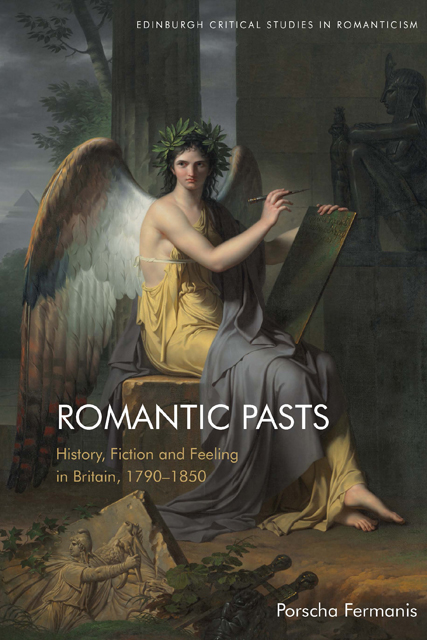Book contents
- Frontmatter
- Contents
- Acknowledgements
- Abbreviations
- Miscellaneous Frontmatter
- Introduction: Romantic Histories of Feeling
- 1 Historical Sentiment and Experience: Burke and Wollstonecraft
- 2 Historical Subjects and Ethical Character: Godwin and Carlyle
- 3 Historical Ethnogenesis and National Feeling:Scott, Moore, and Southey
- 4 Historical Style and the Man of Letters: Macaulay and Carlyle
- 5 Historical Reviewing: Specialisation and Periodical Culture
- Epilogue: A Romantic Return?
- Notes
- Bibliography
- Index
Epilogue: A Romantic Return?
Published online by Cambridge University Press: 18 November 2022
- Frontmatter
- Contents
- Acknowledgements
- Abbreviations
- Miscellaneous Frontmatter
- Introduction: Romantic Histories of Feeling
- 1 Historical Sentiment and Experience: Burke and Wollstonecraft
- 2 Historical Subjects and Ethical Character: Godwin and Carlyle
- 3 Historical Ethnogenesis and National Feeling:Scott, Moore, and Southey
- 4 Historical Style and the Man of Letters: Macaulay and Carlyle
- 5 Historical Reviewing: Specialisation and Periodical Culture
- Epilogue: A Romantic Return?
- Notes
- Bibliography
- Index
Summary
Against the conception of romantic-era historicism as primarily sentimental or feeling, this book has identified an alternative type of counter-sentimental historicism: one that foregrounds an ethical and representational ambivalence towards sentimentalism without necessarily disavowing it altogether. Both working historians and poststructuralist philosophers of history have tended to pit romantic-era historians against their more scientific successors. This book has argued instead that the written history of the period—usually represented as anomalous, alternative, or transitional in historiographical accounts—is critical to understanding how the history of modern history-writing developed. Despite persistent fears (then and now) that late eighteenth- and early nineteenth-century Britain had not produced a ‘grand history’ in the continental style, the period is unique in providing a diverse set of historiographical alternatives to empirical and positivist history based on investments in certain types of feeling, sympathetic, or sentimental history, while simultaneously proving integral to the rise of empirical history through its incorporation of antiquarianism, its emphasis on documentary and material research, and its inauguration of inductive and hermeneutic methodologies.
Adapting both to the ascent of the novel and to a rapidly industrialising print-media and publishing landscape, romantic-era historians negotiated and synthesised prior modes of antiquarian, philosophical, and sentimental history in the context of newly historicised understandings of character and subjectivity. Acknowledging that ‘reactive behaviour’ shapes the motives and actions of historical individuals is a conceptual intervention in written history that had its first extended airing in the historical moment we now call ‘romantic’, one in which ‘situational narratives’ increasingly privileged dynamic internal processes and their unanticipated or unintended consequences over philosophical metanarratives of progress and decline. At the same time, the recognition that feelings could and should be studied historically resulted in a certain distance from sentimental modes of representation and from the subjective experience of the historical witness and/or interpreter. Situating romantic-era written history within the history (or pre-history) of the history of emotions has therefore ironically meant focusing not so much on sentimental historicism or ‘feeling history’, but rather on the objectification and even suppression of feeling in nineteenth-century historical writing . More specifically, I have argued that the period's written history played an important role in the movement towards reifying feeling into a historically contingent object of study with its own history and process of development; or, in other words, in making feeling amenable to objectification.
- Type
- Chapter
- Information
- Romantic PastsHistory, Fiction and Feeling in Britain, 1790-1850, pp. 178 - 189Publisher: Edinburgh University PressPrint publication year: 2022



